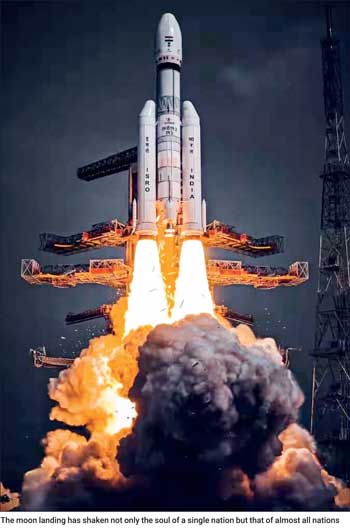Friday Feb 13, 2026
Friday Feb 13, 2026
Saturday, 26 August 2023 00:45 - - {{hitsCtrl.values.hits}}
So far and wide would the reverberations of India’s fine achievement in the space race spread globally that we are still unable to comprehend all the fruit it will put forth. Undoubtedly, this is one of the proudest achievements of the Indian civilisation which is the mother civilisation of Asia. The eminent Indian scientists responsible are the new Einsteins, new Oppenheimers and new Carl Sagans. Make no mistake. India no longer needs the validation of the West. It has come of age in a manner, form, and language that the West best understands – Victory in the Space Race
 When the Indian rocket ‘Chandrayaan-3’ landed on the moon on 23 August 2023, it created a stunning moment that comes but rarely in history, when an age of dreaming ends and a new one begins. The moon landing has shaken not only the soul of a single nation but that of almost all nations. It will alter the way the people of India look at themselves as well as the way others look at the people of India, especially the Indian scientists who made it happen. In other words, this is an ‘epoch-making’ triumph.
When the Indian rocket ‘Chandrayaan-3’ landed on the moon on 23 August 2023, it created a stunning moment that comes but rarely in history, when an age of dreaming ends and a new one begins. The moon landing has shaken not only the soul of a single nation but that of almost all nations. It will alter the way the people of India look at themselves as well as the way others look at the people of India, especially the Indian scientists who made it happen. In other words, this is an ‘epoch-making’ triumph.
So far and wide would the reverberations of India’s fine achievement in the space race spread globally that we are still unable to comprehend all the fruit it will put forth. Undoubtedly, this is one of the proudest achievements of the Indian civilisation which is the mother civilisation of Asia.
The eminent Indian scientists responsible are the new Einsteins, new Oppenheimers and new Carl Sagans. Make no mistake. India no longer needs the validation of the West. It has come of age in a manner, form, and language that the West best understands – Victory in the Space Race.
Nehru’s epic speech – ‘Tryst with Destiny’
This is also a moment that reminds one of Indian Prime Minister Jawaharlal Nehru’s memorable ‘Tryst with Destiny’ inaugural address made on the eve of Indian Independence i.e., 14 August 1947. Now ranked as one of the greatest speeches of the 20th century, here are some excerpts from his speech: “A moment comes, which comes but rarely in history, when we step out from the old to the new, when an age ends,  and when the soul of a nation, long suppressed, finds utterance. It is fitting that at this solemn moment,
and when the soul of a nation, long suppressed, finds utterance. It is fitting that at this solemn moment,
we take the pledge of dedication to the service of India and her people and to the still larger cause of humanity. At the dawn of history, India started on her unending quest, and trackless centuries are filled with her striving and the grandeur of her successes and failures. Through good and ill fortune alike, she has never lost sight of that quest, forgotten the ideals which gave her strength”.
Landing on the moon is a moment of pure joy to celebrate.
Not to celebrate a rapacious conquest of land and other people, spilling blood.
But a bloodless conquest of space.
India has done what was unthinkable in India since the dawn of its birth.
To land on the moon.
India is now on the moon.
India’s lovers and well-wishers are all over the moon.
Ecstatic and delighted.
Metaphorically speaking, Lord Ganesha – God of Wisdom has done his work. His blessings for a wise and enlightened India are on full display. The doctrine of ‘Manifest Destiny’ long touted as the cruel rationale and justification for the oppression of the dark races in the colonial era is being disapproved and demolished.
Every non-white i.e., black, brown and coloured man (and woman) who was for over a millennium despised and downgraded for not being on par with the White Man due to perceived inferiority can gain moral strength from India’s spectacular success.
Who can forget Lord Macaulay’s “Minute Upon Indian Education”? He said unapologetically, “I have never found one among them who could deny that a single shelf of a good European library was worth the whole native literature of India and Arabia.”
Lord Macaulay produced in 1835 his famous “Memorandum on (Indian) Education” which was scathing on the inferiority (as he saw it) of native (particularly Hindu) culture and learning. He argued that Western learning was superior, and currently could only be taught through the medium of English. There was therefore a need to produce—by English-language higher education— “a class of persons, Indian in blood and colour, but English in taste, in opinions, in morals and in intellect” who could in turn develop the tools to transmit Western learning in the vernacular languages of India. Among Macaulay’s recommendations were the immediate stopping of the printing by the East India Company of Arabic and Sanskrit books and that the company should not continue to support traditional education beyond “the Sanskrit College at Benares and the Mahometan College at Delhi” (which he considered adequate to maintain traditional learning)”.
The entire non-white world should be grateful to India for achieving what seemed impossible or unattainable, and for restoring a rare sense of pride for the entirety of the non-white races.
Day of Resonance
August 23, 2023, resonates with another momentous day of ground-breaking significance at the beginning of the last century.
It was the day that Japan defeated Russia in 1905. Battle of Tsushima, (27-29 May 1905), was the naval engagement of the Russo-Japanese War, which led to the final, crushing defeat of the Russian navy in that conflict at the height of Western colonialism.
It prompted a young Oxford lecturer, Alfred Zimmern, to put aside his lesson on Greek history to announce to his class that “the most historical event which has happened, or is likely to happen, in our lifetime has happened; the victory of a non-white people over a white people.”
Japan’s spectacular military victories at the beginning of the 20th century and their impact on Asian intellectuals are well documented in Pankaj Mishra’s book titled, “From the Ruins of Empire: The Revolt Against the West and the Remaking of Asia.”
This work is a survey of Asian intellectuals in the late 19th and early 20th centuries and their role in pan-Asian, pan-Islamic, and anti-colonial movements. The book begins with an electrifying moment in Asia’s struggle for liberation from Western domination: the spectacular Japanese naval victory over Russia at the Battle of Tsushima in May 1905, which stunned Asians and Africans living at the time under the yoke of colonialism.
This victory of the small but resurgent Japanese navy over the imperial might of what was then accepted as a major European power fired the imagination of an entire generation of Asian leaders.
Jawaharlal Nehru, Mohandas Gandhi, Sun Yat-Sen, Mao Zedong, the young Kemal Ataturk, and nationalists in Egypt, Vietnam, and many other countries welcomed Japan’s decisive triumph in the Russo-Japanese War with euphoric zeal. In Indian cities, people distributed sweets in celebration of the Japanese Military victory. “And they all drew the same lesson from Japan’s victory,” Pankaj Mishra writes. “White men, conquerors of the world, were no longer invincible.”
Even Lord Curzon, Viceroy of India, noted that “the reverberations of that victory have gone like a thunderclap through the whispering galleries of the East.” The world wars that followed further shrunk Europe of much of what remained of its moral and political authority in Asian eyes. “In the long view, however,” Mishra concludes, “it is the battle of Tsushima that seems to have struck the opening chords of the recessional of the West.”
Japan’s defeat of Russia in 1905 was uplifting news for Asians. For the first time since the Middle Ages, a non-European country had vanquished a European power in a major war. And Japan’s victory gave way to a hundred-and-one fantasy – of national freedom, racial dignity, or simple vengefulness – in the minds of those who had bitterly endured European occupation of their lands.
Narendra Modi – transformed India like a great Chakravarti King
India will no longer be the country that its rivals would take for granted with contempt for both its leaders and people, but a new India conscious of its place in the world and obligations to both humanity and all other living beings. India’s Constitutional provision that “it shall be the duty of every citizen of India to protect and improve the natural environment including forests, lakes, rivers and wildlife and to have compassion for living creatures” (Article 51 A (g)) will gain a new lease of life. This is the vision that India’s great son, Gautam Buddha, had for Bharat and its greatest Chakravarti Emperor Asoka dutifully strove to establish in the form of a compassionate society.
India’s moral voice can be expected to echo in the far-flung corners of the world in a manner that the Buddha, Mahavira, Asoka, Nagarjuna, Swami Ramakrishna, Swami Vivekananda, and Mahatma Gandhi and the like resounded to the serene joy and delight of humankind. Narendra Modi as India’s Prime Minister for the last nine years, since 2014, has transformed India like a great Chakravarti King and raised the bar with vision. This must be acknowledged.
When India’s time to lead the world comes, in the eloquent words of the celebrated French writer Victor Hugo, ‘no army will be able to stop’.
We the people of Sri Lanka must be chivalrous in our appreciation, especially of the world-shaking deeds of our immediate neighbour India.
We must gratefully acknowledge that it was India more than any other country that first introduced the value system for the moral and ethical foundations of Asia, through the spread of the influence of Buddhism and Hinduism.
We wish India well.